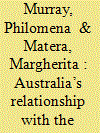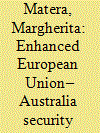|
|
|
Sort Order |
|
|
|
Items / Page
|
|
|
|
|
|
|
| Srl | Item |
| 1 |
ID:
159681


|
|
|
|
|
| Summary/Abstract |
After decades of tension, Australia and the European Union (EU) now have a substantive relationship, interacting and cooperating with each other within a wide range of areas. The relationship is currently at a critical turning point. The Framework Agreement has, for the first time, elevated the relationship to a treaty level. It strengthens Australia–EU actions and interests on bilateral, regional and multilateral issues. There is considerable potential for closer cooperation and more extensive pooling of the resources and capacities of both interlocutors on a range of policies and within the multilateral context. This article provides an assessment of the relationship, the current state of play and key challenges facing the relationship as the EU and Australia forge stronger ties through the conclusion of a Framework Agreement and the commencement of discussions on a Free Trade Agreement at the same time as the UK’s exit negotiations from the EU. It demonstrates that, although there are challenges facing the relationship, there are also significant opportunities to further develop and strengthen ties.
|
|
|
|
|
|
|
|
|
|
|
|
|
|
|
|
| 2 |
ID:
159684


|
|
|
|
|
| Summary/Abstract |
Since January 2003, the European Union (EU) has launched over 30 civilian and military crisis management missions under the Common Security and Defence Policy. These missions have involved the participation of both EU member states and third states. In order to help facilitate the participation of third states in these missions, the EU established the Framework Partnership Agreements on crisis management, setting out the legal framework for third-state participation. In April 2015, Australia became the seventeenth country to sign such an agreement with the EU. This agreement reflects both the common interest and values shared by Australia and the EU and the extent to which EU–Australia relations have evolved and deepened over the years. In addition, the increased engagement and socialisation of Australian military and civilian personnel with individual EU member states through their participation in such operations as the International Security Assistance Force operation in Afghanistan, led by the North Atlantic Treaty Organization, and the Combined Maritime Force have further facilitated opportunities for security cooperation at the EU level. Shared concerns and interests on counterterrorism, counter-piracy, instability and capacity-building have also opened up opportunities for increased cooperation between the EU and Australia. This article assesses the significance of the Framework Partnership Agreements on crisis management for EU–Australia relations within the area of security cooperation, and examines future prospects for cooperation.
|
|
|
|
|
|
|
|
|
|
|
|
|
|
|
|
| 3 |
ID:
145779


|
|
|
|
|
| Summary/Abstract |
Any consideration of classifying the relationship between the European Union (EU) and Australia as a strategic partnership would not have entered the lexicon of either partner in past decades. This article traces the development and maturing of this relationship from decades of tension and recrimination to mutual understanding and engagement on issues of common interest. It illustrates that although the relationship cannot be regarded as a strategic partnership, there is evidence of increasing common ground as the two interlocutors are no longer worlds apart. There is less perception of the tyranny of distance and the burden of memory. The relationship may not be a strategic partnership, but it is a partnership that has elements that are comprehensive, reciprocal, empathetic, long-term oriented, regional and global.
|
|
|
|
|
|
|
|
|
|
|
|
|
|
|
|
| 4 |
ID:
159686


|
|
|
|
|
| Summary/Abstract |
Despite a troubled trade history dominated by disputes over agriculture, the negotiation of a European Union (EU)–Australia free trade agreement (FTA) was initiated in 2015. The initiation of these negotiations was made possible because of the shift in EU trade policy towards the negotiation of what the EU terms ‘new generation free trade agreements’. The EU has concluded FTA negotiations with South Korea, Singapore, Vietnam and Canada, and is negotiating other FTAs— notably with Japan and the USA . The EU faces many commercial challenges to its FTA negotiations that go beyond tariff reduction, including the protection of its geographical indicators, public procurement and investor–state dispute settlement. These issues are likely to be substantial features of any EU FTA with Australia. In addition to these challenges, the promotion of sustainable development interests and human rights through FTA negotiations is an important component of the EU’s approach. The EU’s position on the trade-related aspects of sustainable development and the negotiation of human rights conditionality has presented significant challenges to the EU’s trade agenda, particularly in negotiations with Canada and Singapore. This article draws lessons from the EU’s new generation trade agreement negotiations to date. It compares these negotiations with Australia’s approach to FTA negotiations, and analyses potential stumbling blocks for an EU–Australia FTA in light of past tensions in the relationship. The article argues that shifts in both EU and Australian trade policies and positive developments in the relationship mitigate past obstacles to a negotiated agreement. However, EU– Australia relations still suffer from the tyranny of distance. The resulting deficit in foreign policy salience between the EU and Australia broadens the best alternatives to a negotiated agreement.
|
|
|
|
|
|
|
|
|
|
|
|
|
|
|
|
|
|
|
|
|